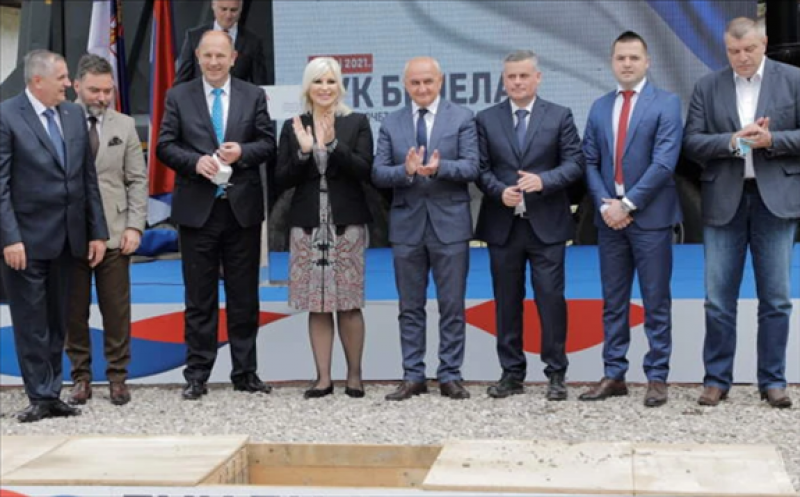The prime ministers of the Republic of Srpska and Serbia, Radovan Višković and Ana Brnabić, attended the groundbreaking ceremony for the construction of the 93 MW Buk Bijela hydropower plant on the Drina river in the municipality of Foča. The facility should be completed in four years.

HPP Buk Bijela is a joint EUR 220 million project of power utilities Elektroprivreda Srbije (EPS) and Elektroprivreda Republike Srpske (ERS), owned by Serbia and Srpska, respectively. In the joint venture Hidroenergetski Sistem (HES) Gornja Drina, EPS is the majority owner wth 51% while ERS controls the remainder. HES Gornja Drina was established to build three HPPs in the upper course of the Drina river: Buk Bijela, Foča (44 MW) and Paunci (43 MW).
Buk Bijela will have a 57-meter-high gravity dam, and the expected annual production is 332 GWh. Project development started several decades ago, initially by Bosnia and Herzegovina, Montenegro and Serbia, with a much bigger capacity planned.
Višković: The deadline for construction is six years, but the goal is to complete it in four
Prime Minister of the Republic of Srpska Radovan Višković said the project means life, connection, survival and prosperity, while Prime Minister of Serbia Ana Brnabić said the new HPP represents a new beginning in relations between Serbia and the Republic of Srpska.
The deadline for the construction of HPP Buk Bijela is six years, but the goal is to complete it in four, Višković announced.
Ministers of energy of the Republic of Srpska and Serbia, Petar Đokić and Zorana Mihajlović, respectively, and the directors of ERS and EPS, Luka Petrović and Milorad Grčić, were present at the ceremony of the laying of the foundation stone.
BiH does not support the project, Republic of Srpska and Serbia reply that everything is according to the regulations
Bisera Turković, the Minister of Foreign Affairs of BiH, said that the Republic of Srpska, a Serb-dominated entity in BiH, has no consent of BiH for the construction of HPP Buk Bijela.
Serbia must know that by entering the project, which does not have the consent of the state and which opposes the decisions of the BiH Constitutional Court, it risks not only economic damage, but also harm to relations between Serbia and BiH, she said.
Prime Minister Radovan Višković replied the construction of the HPP is not under the jurisdiction of BiH.
Granting concessions for construction is in the competence of the Commission for Concessions of the Republic of Srpska, so the Government of Serbia did not need to talk to anyone else, except the Government of the Republic of Srpska, he said.
Prime Minister Ana Brnabić said Serbia had done an analysis of all rules, laws, the Constitution of BiH, in order to protect its investment. Analyses have demonstrated that so far all concessions in BiH have been issued by the entities or cantons and none have been disputed, she added.
NGOs are demanding that construction be stopped
Non-governmental organizations and river and extreme water sports enthusiasts warned it is necessary to protect the Drina river and stop the construction of three dams in its upper course, according to a statement from Aarhus Center in Sarajevo, Center for Environment in Banja Luka, Green Home, Nature Lovers Montenegro, NGO Da zaživi selo, SRK Lipljen – Pljevlja from Montenegro and WWF Adria.
The Drina river and its tributaries are the world’s most important habitat for the globally endangered species of Hucho hucho, among other strictly protected species, and they are an increasingly popular tourist destination.
Several cases have been initiated against the construction of HPP Buk Bijela with domestic and foreign institutions
In December 2020, 24 members of the House of Representatives of the Parliament of BiH initiated a case before the Constitutional Court against the decision by the Republic of Srpska to issue a concession for the construction of the three HPPs, as decisions regarding state property such as rivers at international borders can only be made at the central government level.
A case is also underway before the Espoo Convention Implementation Committee over BiH’s failure to consult with Montenegro on the transboundary environmental impact, while the Aarhus Center in Sarajevo has filed a lawsuit with the Republic of Srpska Supreme Court over outdated environmental impact assessment for the HPPs.